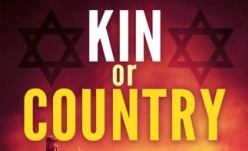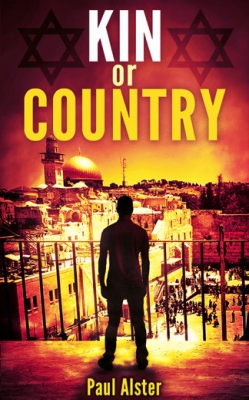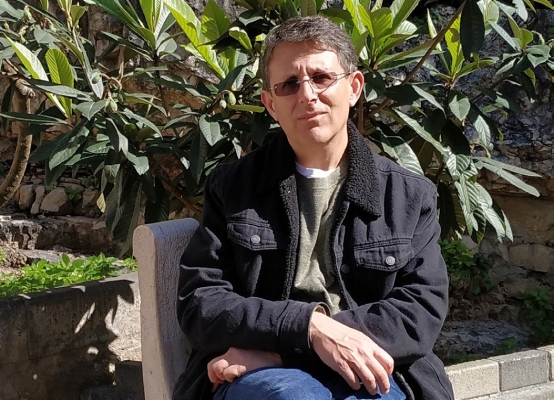Kin or Country - Book Review and interview with Paul Alster
New political thriller "Kin or Country" pulls no punches. Its author, broadcaster and journalist Paul Alster, intrepidly launches head-on into a problem which threatens to overturn the status quo in Israel, namely: the anticipated demographic shift whereby charedim (the ultra-religious) become the majority.
The impetus for writing this debut novel was driven by an interview with Israel's Central Bureau of Statistics which Alster conducted for The Jerusalem Report in 2017. He felt that this was a prospective scenario that needed exploring, but confessed to me that he thought the topic would reach the widest audience via a fictional novel. Still, for readers unfamiliar with Israel's complex social and political background, Alster deftly inserts background information where needed.
In fact, the novel serves as a cautionary tale but is clothed in the appealing format of a political thriller interlaced with a murder investigation. Set 100 years after the establishment of the State of Israel in 2048, the nation is in a ferment over an imminent referendum on its future: whether to maintain the status quo or to split into two states – the ultra-religous Judea centred on Jerusalem and the secular Israel centred on Tel Aviv.
The secular versus ultra-orthodox division in Israeli society which already exists today has, by 2048, been exacerbated by the increasingly inward focus of a nation that had already reached a peace deal with the Palestinian Arabs in the 2030's. The cast of characters is drawn from left and right, religious and secular. It focuses on the ultra-orthodox Tenenbaum family of Jerusalem with its overbearing patriarch Baruch, Baruch's good-hearted brother Shmulik and his long-suffering wife Yocheved.
Among their multiple offspring, Alster focuses on the two youngest. We first meet them as teenagers – the rebellious Hila and her younger brother Zvi. Hila goes on to be the black sheep of the family in Tel Aviv while Zvi becomes a charismatic rabbi and political figure.
In fact, one of the strengths of the story is that the ultra-religious are not presented as a monolithic, homogeneous entity. Their factions and indeed individual differences of character and political stance are highlighted. (In fact its varied charedi characterisation is reminiscent of the popular Israeli series, Shtisel, in the way that human emotions and family tensions are universal in appeal.)
The tangled web is intricately woven with other protagonists who include a highly politicised rabbi who views himself as the putative president of a prospective new State of Judea, the chief rabbis, the prime minister and would-be prime minister. Interference from outside powers complicates matters further in the form of an American, evangelical, political leader and Iranian interests. The majority of them exhibit what Alster categorises as "flawed morality across the political spectrum".
In addition to the nervous tension created by the referendum, part of the tension of the story revolves around a murder. The reader can savour an almost delicious sense of dramatic irony created by knowing whose body is found in the Jerusalem hills and how the murder came about, whereas the public and the novel's characters cannot until the investigation unfolds.
As the novel reaches its conclusion, there is a certain grim satisfaction experienced by the reader as the murderer is exposed, while the result of the referendum is not a foregone conclusion and may ultimately surprise.
In fact, in a foxnews.com op-ed from September 2020, the author expresses surprise at how the Covid pandemic and its repercussions "have already seen many of the issues I envisioned rush to the fore much faster than expected."
Alster notes when discussing the book, "It foresees a scenario that could easily become reality ... unless drastic societal changes come to pass in the next few years."
Asked to elucidate on what these societal changes might be, the author refers not only to required changes in attitude in the charedi world but also to the necessity for greater tolerance on the part of the secular sector.
He ventures to suggest relevant attitude changes: "The charedim need to become more open to the mainstream way of life. In fact, that seems to be happening. During COVID it has been seen that more young charedi men have expressed an interest in leaving the fold. Changes would also occur if the number of children they have is reduced - as is happening among the Arab population."
In fact, he points out to me that there do exist voices from "the more moderate wing of the ultra-religious world' calling for changes. For example, in his foxnews.com op-ed he quotes what he sees as an 'extraordinary recent Facebook post' by Rabbi Dov Halbertal, fomer director of the Office of the Chief Rabbi of Israel: "The religious establishment corrupts the fabric of the state and the state corrupts the fabric of religion. It is not moral that the secular public should fund the religious or the blessed birth rate among the ultra-Orthodox …. There is nothing more outrageous than the phenomenon of receiving a generous amount from the secular public, then spitting in its face."
It would seem that the book's character of Rabbi Zvi Tenenbaum is drawn presciently like that of Rabbi Dov Halbertal, someone who represents a more progressive strand within Charedi socio-political thinking.
"Kin or Country" by Paul Alster is available as a paperback on Amazon at $14.99.
It is also available as a Kindle or ebook download at a variable price.
Producer and International Distributor: eBookPro Publishing
ISBN 9789655751741
The Author
Paul Alster's varied and vigorous career has included a 20-year period as a professional jazz musician in his early years, playing clarinet and saxophone. He is an experienced broadcast and print media journalist who has specialised in intelligence, terrorism and sports reporting. He has worked, amongst other media outlets, for The Jerusalem Report, Fox News, NBC Gold, SKY and SKY Sports and Betting.net. For some time he worked on a British race course, mentally calculating the Tote at lightning speed, and later owned and bred thoroughbred racehorses. He even ran horse-racing in Pardes Hanna.
One of his most recent projects is a regular 50-minute YouTube programme, featuring prominent guest news analysts, called "What the Israeli Papers Say at REEL ISRAEL".
Born in 1967 in Leeds, UK, Alster experienced a block in his career path when his employers discovered he was Jewish after a visit to Israel. He moved permanently to Israel in July 2007 and now lives in Zichron Yaakov. He is married to Paz with whom he has two daughters. One recently finished her army service while the other recently commenced her service.










Comments